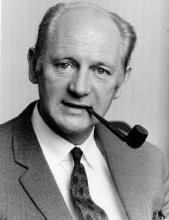Jack Lynch 1966 - 1979:
Jack Lynch became leader of Fianna Fáil in November 1966 on the resignation of Seán Lemass. Born in Cork city in 1917, Lynch was a civil servant in the Department of Justice before he was called to the Bar. He became a practicing barrister on the Cork circuit. However, he was famous as a sportsman in the GAA long before he came to political prominence - Lynch won six All-Ireland medals in succession; five in hurling and one in football, with his native county.
Jack Lynch was first elected to the Dáil in 1948 for the Borough constituency of Cork. He was Minister for Education and the Gaeltacht, 1957-59, Minister for Industry and Commerce, 1959-65 and Minister for Finance, 1965-66. His first period in office from 1966 to 1973 saw the outbreak of the Northern troubles in 1969. Lynch decided that a peaceful approach to Northern policy was the only way forward. The appointment by the Fianna Fáil government in 1970 of a Commission on the Status of Women was the first politically significant State initiative on women’s rights and the equality agenda. Under Lynch, Ireland joined the European Economic Community (now the European Union) in 1973. This was a defining moment in modern Irish history and contributed hugely to Ireland’s future economic prosperity.
Jack Lynch increased Fianna Fáil’s share of the vote in the General Election of 1973 but it was lost by the narrowest of margins. During the opposition years 1973-77, Fianna Fáil established Ógra Fianna Fáil, the party’s youth organisation, which gave the party a younger profile at all levels of political activity. Jack Lynch returned to office in 1977 with the largest majority ever received by Fianna Fáil and resigned as Taoiseach and Leader of Fianna Fáil in 1979.
Former Party Leaders & Taoisigh:

